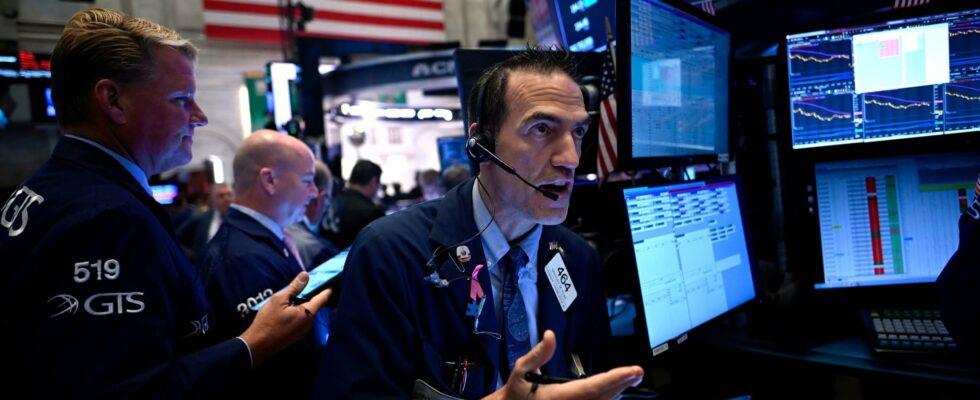No one escapes the rule. For two years, the elite of global finance have been slapped on the wrist by American regulators for talking business where they should not. In September, Stifel Nicolaus & Co, Invesco and the Canadian Imperial Bank of Commerce, accused of allowing professional exchanges to take place on messaging services such as WhatsApp, agreed to pay $100 million to settle the matter.
A month earlier, the Securities and Exchange Commission (SEC) had already imposed nearly $400 million in fines on 26 banking and financial institutions for the same reason. Since the “WhatsApp scandal” broke out in 2022, everyone has taken it for granted – Wells Fargo, BNP Paribas, Morgan Stanley, Société Générale, Citigroup… – and billions of dollars in sanctions have been imposed.
“Companies were slow to understand that private messaging was a problematic gray area,” observes technology and data protection specialist Sonia Cissé, associate lawyer at Linklaters. In the financial sphere, as elsewhere, their use has slowly but surely spread. “Covid accentuated the phenomenon, because not all employees were in the same boat during the confinements. Some were able to work from home with the Bloomberg terminal, several screens, a broadband connection. Others were not. And , when customers asked them, they had to find alternatives,” confides a professional in the sector.
The beginning of the nightmare for financial companies. Because the law requires them to archive the majority of written and vocal communications from traders on their markets. If regulators suspect price manipulation, they must be able to trace the thread of the exchanges. See who spoke to whom, about what, when. What orders were given. To determine, for example, whether there is insider trading.
An ultra-controlled framework which encourages employees to maintain the reserve which is their responsibility. Conversely, WhatsApp and others blur the boundaries. “Certain insider trading can come from clumsiness. When using these messaging services, employees are more likely to relax their vigilance despite internal awareness-raising actions. They discuss informal subjects and, without being careful, can transmit professional information that they were not supposed to give,” warns Sonia Cissé. The archives are, moreover, not only used by the authorities. “In the event of a dispute with a client, it is essential to be able to prove which orders they requested,” points out Andrea Tueni, head of market activities at Saxo Bank.
WhatsApp and the stock market policeman
The fact that traders’ conversations are preserved does not prevent their communication tools from being highly secure. “We do not have the encryption key to read the conversation archives. Only our customers have it and can provide it to regulators if they request it,” explains Dietmar Fauser, CIO of Symphony, a secure communications platform whose creation was supported by a consortium of major banks – Bank of America, Goldman Sachs, Credit Suisse Group, Deutsche Bank, etc.
Faced with the new uses of Wall Street, companies are adapting. “Third-party solutions now make it possible to monitor applications such as WhatsApp,” the Interactive Brokers teams tell L’Express. The transition to artificial intelligence promises to be more far-reaching for this sphere. All publishers are working to integrate it into the tools of cat used by financial institutions. But trader language poses a challenge for AIs when they try to analyze it.
What is this strange fauna that speaks of “mid”, of “spread”, of “floors” and a number of figures are exchanged in a telegraphic style? Even familiar terms are traps. A “call” or a “butterfly strategy” having nothing to do with a telephone call or shimmering flying insects. “Trader jargon poses a challenge to AIs because it is full of abbreviations and technical terms. For example, they don’t always state the numbers they’re talking about in full. Often, they only detail what’s there. after the comma”, confides Dietmar Fauser.
Voice communications add a layer of complexity to the exercise. “The quality of the sound and the accents of the interlocutors affect the analytical capacity,” confirms Alex de Lucena, director of product strategy at Shield, specializing in the monitoring and compliance of financial communications. But the game is worth the effort because AI is revolutionizing this field on two levels.
First, by saving businesses considerable time. No need to manually enter the “deals” entered into the accounting system. “Artificial intelligence makes it possible to transcribe vocal exchanges and extract useful data more quickly,” points out Dietmar Fauser. The latest generation of AI can analyze immense quantities of documents – annual reports, press releases, etc. –, extract useful details, make summaries or identify trends in trading flows. They take care of tedious tasks, like meeting minutes. “They can also help analyze changes between two Central Bank press releases. Sometimes small modifications can have a large impact here and are, for this reason, closely scrutinized,” confides Andrea Tueni, of Saxo Bank.
Traders closely monitored by AI
Some messaging developers even plan to analyze the tone of conversations to enrich the analysis provided to the customer – for example, does the transaction leave the interlocutor skeptical? But AI doesn’t just save Wall Street time. Above all, it allows institutions to better monitor the exchanges of their flock, in order to detect embezzlement. In the past, fraudsters could hope to blend in with the crowd. And even when suspicions triggered an investigation, it took time. In certain cases, “hundreds of people had to be mobilized to control years of audio recordings”, illustrates lawyer Sonia Cissé.
AI can now transcribe all these conversations, automatically analyze them and flag suspicious passages. Evoking WhatsApp will immediately trigger the alert. But the strength of AI is that it goes beyond just spotting keywords. “It will work even if the word is misspelled and will better identify people who are trying to shift a conversation to an unapproved channel, even if they use language precautions or coded terms,” warns Shield’s Alex de Lucena . Traders tempted to go out of their way should think twice: Big Brother is watching them.
.
